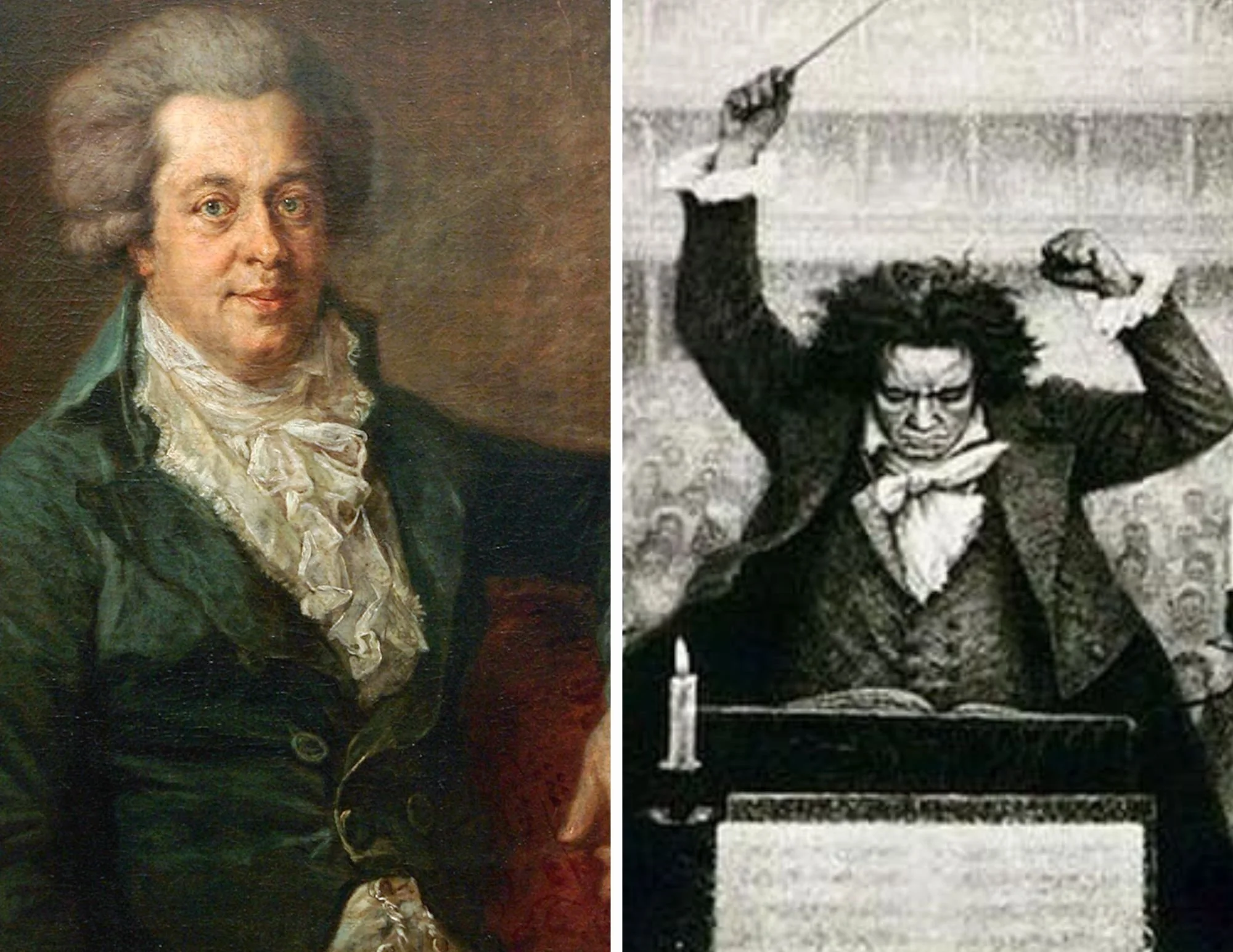Mozart and Beethoven: How Arrogance Made Two Musical Geniuses
Mozart (Photo taken from Longmont Chorale) and Beethoven conducting his 9th symphony
Both composers were extremely difficult with raging tempers, though one was magnetic causing people to love him while others simply didn’t like the other. Their personalities made for two of Europe’s most prolific music creators. Though, without their negative traits, they may not be known for their talent, argues music teacher Cassandra Portee
Wolfgang Mozart and Ludwig van Beethoven were both geniuses in their own right. Both composers were talented in their crafts, and they left strong, powerful impacts in the music world. Mozart received praise and help from his father, while Beethoven strongly desired the approval of his father who thought he was not good enough in what he did musically. Let’s take a look at both composers and their temperaments:
Mozart
It is said his arrogance was used as a defense mechanism to protect him from rejection and criticism. Mozart was confident in his abilities and felt he deserved the success he achieved, and he wanted more. He was a hard person to work with because his arrogance may have contributed to his success, but not with people. It was his self-entitlement, and his cruel sense of humor that attributed to this. Though he was a genius, he could not manage money. There are some scholars who believe there are indications that Mozart exhibited some traits of Borderline Personality Disorder (BPD).
In letters he wrote, he would share how he felt an emptiness that is often expressed by people with BPD. He also had temper outbursts, and impulsivity. On top of his emotional state, he drank a lot and he had a gambling problem, which led to a debt problem, resulting in him never being able to live a comfortable life.
And, Mozart never wasted his time associating with people, who he felt were not as intelligent as he was. When I taught a lesson on Mozart, I told my students Mozart probably would not have time for me because, for him, I would most likely not be on his level intellectually to be associated with him. My students laughed at my statement, but I told them he was so, so smart that very few people could sit down and have a conversation with him, people he felt was worth his while. A stubborn man and he was not willing to let another person get the upper hand on him. Unfortunately, he was poor when he died and there was not enough money to put a marker for his grave.
Beethoven
Beethoven was hot-tempered, arrogant, and he did not have good manners. He had a strong presence that was magnetic, causing people to be drawn to him. But, he did not take too kindly when someone corrected him. He always thought he was in the right. One example of his strong arrogance was when was at a restaurant with some friends, he placed his order. When the waiter brought him his food, he told the waiter the order was wrong. The waiter told him he had his order correct, and Beethoven never considered himself wrong. To show his displeasure at the waiter for disagreeing with him, Beethoven stood, up, took the plate of food, and dumped it on the waiter, and proceeded to laugh at how ridiculous the waiter looked covered in food. Did he feel contrite about what he had done? Absolutely not! He felt he had the final say in the matter, and for this reason he was satisfied.
But he was beloved when he died. The streets were overflowing with approximately 10,000-30,000 people who took part in his funeral procession.
Did arrogance contribute to their musical genius?
Neither man was tall. When I teach my students about either composer, my students are picturing them to be over 6 feet tall! They are surprised to learn they both were 5’ 4” tall, and they were a little shorter than me! They were not tall in stature, but they were tall in their temperaments and personalities.
The question is: did their arrogant personalities play an important role in their skills and talents to write great music? I think so, and maybe their music may not have stood out strongly if they did not have the personalities they both had.
Beethoven was a perfectionist. Mozart would write a music composition in a short amount of time, and few changes were made after he completed a music piece. Beethoven, on the other hand took a long time to write a symphony. Symphonies were very hard for him to write and it would take him years to finish one. Mozart wrote 41 symphonies, and Beethoven wrote only 9 symphonies. Each composer was different and similar in their personality traits, but they still had a lot in common when it came to how they dealt with people, and in their temperaments.
What would the music world be like without the great works written by these amazing composers? Would we want them to still be the same, or are we content in thinking their arrogances played a major role in how they composed? You can decide for yourself.

